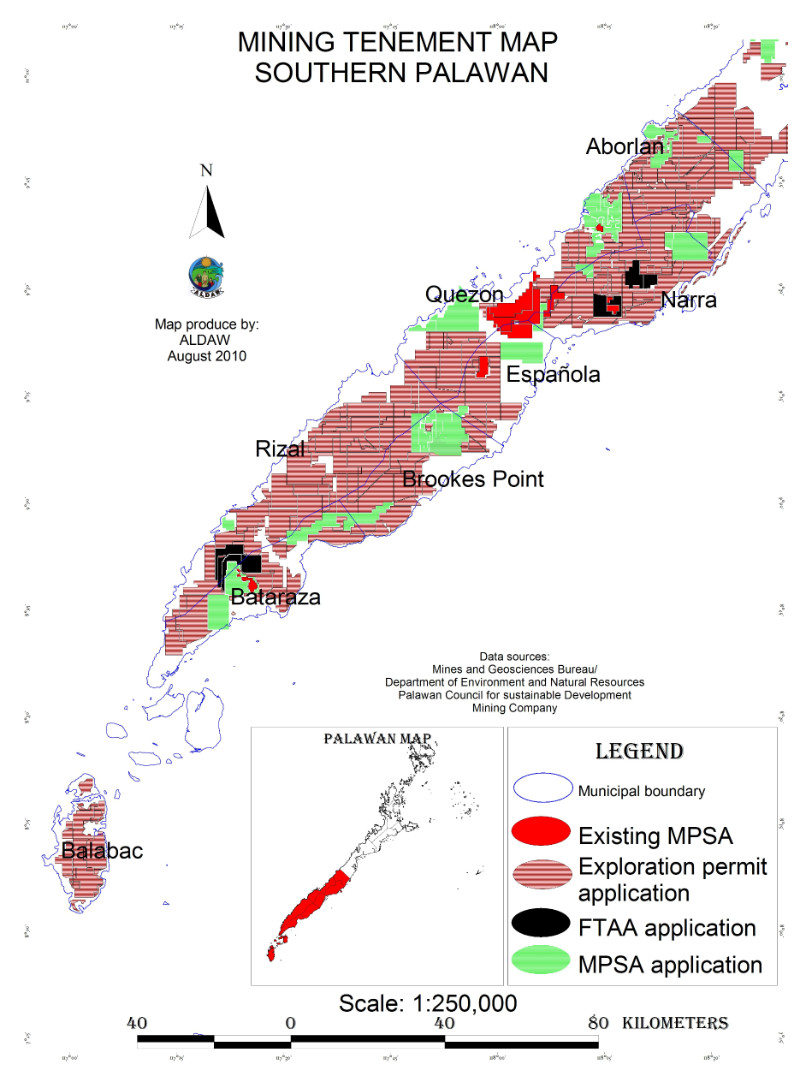
Despite continued opposition by indigenous communities and the efforts of NGOs, indigenous federations like NATRIPAL (Nagkakaisang mga Tribu ng Palawan) and foreign academic institutions, government officials in the Philippines are deadest on letting mining companies have their way with the island of Palawan.
According to ALDAW (Ancestral Land/Domain Watch), one of several groups working to protect the UNESCSO Man and Biosphere Reserve:
On December 21, the Palawan Council for Sustainable Development (PCSD) [in the absence of the chair, NGO representative, and with the vice governor opposing] affirmed the decision of the PCSD executive committee made last December 4, 2010, to issue Strategic Environmental Plan (SEP) clearances to Macro Asia Mining Corporation and Ipilan Nickel Mining Corporation (INC).
Baham Mitra, the current Governor of Palawan and chairman of the PCSD is expected to reveal his own decision on whether to endorse a SEP clearance to MacroAsia, Ipilan Nickel Corporation and LEBACH in the next few days.
Whatever Mitra’s decision, it’s clear that “The PCSD decision overstepped the bounds of the law that it’s mandated to uphold, and ultimately placed Palawan’s natural and cultural heritages at great risk” says Gerthie Mayo Anda, an Attorney from The Environmental Legal Environmental Center (ELAC) .
The PCSD is supposed to implement the SEP which is “a very special environmental law [aimed] at ensuring the sustainable development on the island,” explains ALDAW. “This ‘Strategic Plan’ was created and put into place through conspicuous financial resources coming from the European Union which culminated with the implementation of the Palawan Tropical Forestry Protection Programme (PTFPP).”
Meanwhile, MacroAsia Corporation and Ipilan Nickel Corporation “are working hard to prove that their operations have been favourably accepted by local communities”, says ALDAW. Using classic subversion, they’re approaching villagers outside of Brookes’ Point Municipality to make statements that favour the companies. A councillor from one village in northern Palawan was even invited to speak “on the behalf of the indigenous peoples of Brookes’ Point in a press conference jointly organized by MacroAsia and INC, on January 5. This has raised a fierce reaction on the part of the traditional and legitimate indigenous leaders.”
Palawan is well known for having some of the richest biodiversity in Southeast Asia. For this reason, the entire island was declared by the UNESCO as a Man and Biosphere Reserve more than 15 years ago. The island is home to some of the oldest trees in the southern hemisphere, more than 200 endemic species and more than a 100 endangered species according to the IUCN Red List.
Palawan is also is home to the Indigenous Tagbanua, Palawan, Tau’t Bato, and the Bataks. In fact, the island is sometimes referred to as “the Cradle of Philippine Civilization” because of archaeological discoveries on the island. For instance, in 1962, archaeologists unearthed fossils at Lipuun Point (now the Tabon Cave Complex) estimated to be 22,000 to 24,000 years old. The Tagbanua and Palawan are likely descended from the Tabon Caves’ inhabitants.
Today, none of this seems to matter. The government wants to turn Palawan into a mining hotspot and that’s all there is to it.
However, the government isn’t the only problem. According to ALDAW, the UNESCO is playing a role as well.
“We tried to approach UNESCO several times on this issue” said a spokesman of the ALDAW Network (Ancestral Land/Domain Watch). “Through its silent and inertia, the UNESCO has shown, once again, how these declarations bring little or no benefits to local communities, especially when there is no clear political commitment to uphold them. Overall UNESCO has revealed the general weakness of the entire United Nations system, that is a chronic incapacity to take unequivocal positions on urgent matters requiring unambiguous and concerted political efforts,” he added.
 Density of mining claims in Northern Palawan
Density of mining claims in Northern Palawan
On a far more serious note, murder can now be added to the long list of fears and concerns for Palawan and its inhabitants. On January 24, Dr. Gerry Ortega, a respected environmental advocate, broadcast journalist and anti-mining activist in Palawan was shot dead in Puerto Princesa City.
A police investigation into the tragic shooting has uncovered a number of government connections. For instance, the gun that was recovered by police turned out to be registered to ATTY. Romeo Serratubias, a former provincial government administrator who served under the term of Joel T. Reyes, the former Palawan governor. It appears that Serratubias sold the gun to Percival Lesias–who is, according to sources, an employee of the provincial government–on January 15, 2010. Eventually, the weapon was received by Marlon Recamata, the man responsible for Ortega’s death.
 Density of mining claims in Southern Palawan
Density of mining claims in Southern Palawan
To say the least, it is an affront to President “Noynoy” Aquino’s stance on “anti-corruption”–just as the mining operations themselves, are an affront to his stance on “poverty alleviation.”
After all, if the mining companies get their way, and government officials keep bending over backwards to let them, the Indigenous Peoples’ land-based economy and their cultural heritage could be decimated.
Address your concerns to:
For more information, you can watch ALDAW videos on Vimeo and YouTube – or contact the ALDAW at aldaw.indigenousnetwork@gmail.com , ELAC (Environmental Legal Assistance Center) palawan@elac.org.ph or padayon_egl@yahoo.com and or Alyansa Tigil Mina (nc@alyansatigilmina.net or alyansatigilmina@gmail.com )

Indigenous Peoples are putting their bodies on the line and it's our responsibility to make sure you know why. That takes time, expertise and resources - and we're up against a constant tide of misinformation and distorted coverage. By supporting IC you're empowering the kind of journalism we need, at the moment we need it most.